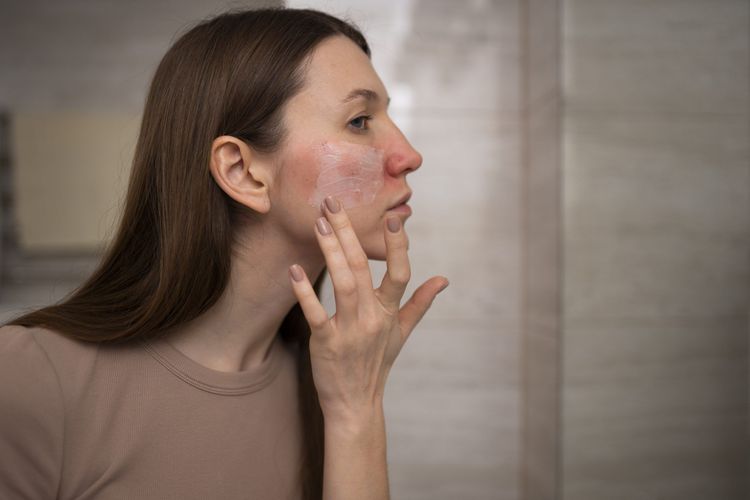Psoriasis is a chronic, immune-mediated inflammatory skin disease that affects millions of people worldwide. Although its exact cause remains elusive, researchers have identified a multifactorial basis for the disorder. We'll examine the key factors contributing to psoriasis, including genetic predisposition, immune system dysregulation, environmental influences, infections, and lifestyle factors. Understanding these causes helps clarify the disease process and guides current and future treatment strategies.
Genetic Predisposition
Inherited Susceptibility

One of the most well-supported theories in psoriasis research is the strong genetic component of the disease. Studies of twins and families reveal that if one identical twin has psoriasis, the other twin has up to a 70% chance of developing the condition. In contrast, the risk is lower in fraternal twins, which suggests that genes play a significant role but are not the sole determinant.
Approximately one-third of psoriasis patients report a family history of the disease. Researchers have identified several genetic loci—often referred to as PSORS1 through PSORS9—associated with psoriasis. Among these, PSORS1 is considered the most significant, likely accounting for 35–50% of the disease's heritability.
Key Genes and Pathways
Many of the genes linked to psoriasis are involved in regulating the immune system. For instance, variations in the gene encoding the major histocompatibility complex (MHC) protein HLA-Cw6 have a strong association with the most common form of psoriasis, known as psoriasis vulgaris. Other genes have also been implicated, such as those encoding interleukin-12 subunit beta (IL12B) and the interleukin-23 receptor (IL23R). These genes contribute to the function and differentiation of T cells—white blood cells that play a central role in immune responses.
Genetic studies continue to uncover mutations and variations that predispose individuals to psoriasis. However, the fact that not everyone with a predisposing gene develops the condition indicates that genetics sets the stage for psoriasis while other factors ultimately trigger its onset.
Immune System Dysregulation
Autoimmune Characteristics
At its core, psoriasis is an immune-mediated disorder. The body's immune system, which normally protects against infection, mistakenly targets healthy skin cells. In psoriasis, T cells—particularly the T helper 1 (Th1) and T helper 17 (Th17) subsets—become overactive. These cells release a cascade of cytokines, which are signaling proteins that drive inflammation and stimulate rapid skin cell proliferation.
Cytokines and Inflammatory Pathways
Key cytokines implicated in psoriasis include tumor necrosis factor-alpha (TNF-α), interleukin-17 (IL-17), and interleukin-23 (IL-23). In particular, the IL-23/Th17 axis has been recognized as central to the disease process. When IL-23 binds to its receptor on T cells, it promotes the production of IL-17 and IL-22, stimulating keratinocytes (the predominant cell type in the epidermis) to proliferate rapidly. This accelerated cell turnover leads to the buildup of thick, scaly patches on the skin.
The success of biologic drugs targeting these cytokines further supports the role of immune dysregulation in psoriasis. By blocking TNF-α or inhibiting the IL-23/Th17 pathway, these therapies can reduce inflammation and slow the overproduction of skin cells, leading to marked improvement in patients' symptoms.
Environmental Triggers
While genetics and immune factors create a predisposition for psoriasis, environmental triggers often serve as the “spark” that ignites the condition. These triggers vary widely among individuals and may change over time.
Physical and Chemical Stimuli
- Skin Trauma: One of the classic phenomena associated with psoriasis is the Koebner effect, where new lesions develop at sites of skin injury. This means that cuts, burns, or even sunburns can trigger a flare-up of psoriasis in susceptible individuals.
- Climate and Weather: Seasonal changes, particularly during winter, when the skin is drier and there is less natural sunlight, can exacerbate psoriasis symptoms.
- Irritants: Exposure to harsh chemicals or detergents or even excessive bathing with hot water can disrupt the skin barrier and lead to flare-ups.
Psychological Stress
Emotional stress is widely recognized as a trigger for psoriasis. Stressful events can alter the body's hormone balance and immune responses, thereby increasing the likelihood of an inflammatory reaction in the skin. Many patients report that periods of high stress coincide with the worsening of their symptoms.
Lifestyle Factors

Lifestyle choices can also influence psoriasis. Factors such as smoking, excessive alcohol consumption, and obesity have all been linked to the onset and severity of the condition. For example, obesity not only increases systemic inflammation but may also affect how the body responds to psoriasis treatments. Conversely, lifestyle modifications—such as weight loss, stress management, and cessation of smoking—may help reduce the frequency and severity of flares.
Infections and Microbial Factors
Role of Bacterial and Fungal Infections
Infections are another important trigger for psoriasis. A well-known example is guttate psoriasis, which often develops in children and young adults after a streptococcal throat infection. The immune response to the infection is believed to cross-react with antigens in the skin, leading to the rapid development of psoriasis lesions.
Additionally, certain microorganisms colonize the skin and gut, which has been associated with psoriasis. Bacteria such as Staphylococcus aureus, fungi like Malassezia, and yeasts such as Candida albicans have all been implicated in triggering or exacerbating the condition. Although these microbes do not cause psoriasis directly, they can stimulate the immune system and contribute to the inflammatory milieu that favors the disease.
Gut-Skin Axis
Recent research has begun to explore the "gut-skin axis," a concept that links the health of the intestinal microbiome with skin disorders, including psoriasis. Alterations in gut bacteria (dysbiosis) may increase intestinal permeability, allowing bacterial components to enter the bloodstream and trigger systemic inflammation. Although the precise mechanisms remain under investigation, modulating the gut microbiota through diet or probiotics is emerging as a potential adjunctive strategy in psoriasis management.
Medications and Other Triggers

Certain medications are known to trigger or worsen psoriasis in some individuals. Drugs such as beta blockers, lithium, antimalarials, nonsteroidal anti-inflammatory drugs (NSAIDs), and even withdrawal from corticosteroids can precipitate flare-ups. Patients and healthcare providers need to recognize these associations, as discontinuing or adjusting the dosage of an offending medication may improve symptoms.
Recent Research and Emerging Insights
Advances in genomic and immunologic research have provided deeper insights into the pathogenesis of psoriasis. Modern genome-wide association studies (GWAS) have expanded the list of genetic variations associated with the disease, shedding light on the complex interplay between different genes and the immune system.
In parallel, the development of biologic therapies targeting specific cytokines has revolutionized the treatment landscape for moderate to severe psoriasis. These therapies confirm the central role of the immune system and offer hope for patients with previously difficult-to-treat forms of the disease.
Moreover, emerging research into the microbiome—both on the skin and in the gut—opens new avenues for potential treatments. Fecal microbiota transplantation (FMT) and probiotics are being investigated to restore microbial balance and reduce systemic inflammation. Although these approaches are still experimental, they highlight the growing understanding of psoriasis as a systemic condition influenced by factors beyond the skin.
Conclusion
The causes of psoriasis are multifaceted, involving a complex interplay of genetic predisposition, immune system dysregulation, environmental triggers, infections, medications, and lifestyle factors. Genetics set the stage by conferring susceptibility, while an overactive immune response—especially the dysregulation of T cells and proinflammatory cytokines—drives the rapid turnover of skin cells. Environmental factors such as stress, skin trauma, and climate further contribute to triggering and sustaining the disease. Infections and microbial factors, including skin and gut microbiome alterations, are also emerging as significant contributors.
While no single factor causes psoriasis, the cumulative effect of these diverse elements explains the condition's heterogeneous nature. This multifactorial understanding has important implications for treatment as it supports a personalized approach that may combine immune modulation, lifestyle modification, and, in the future, microbial interventions.
As research continues, we can expect further refinement in our understanding of the pathways involved in psoriasis. This ongoing research promises to improve treatment outcomes and hold the potential to eventually prevent the onset of psoriasis in those at risk.
In summary, psoriasis is a complex disorder with no single cause. Its pathogenesis represents an intricate web of genetic, immunologic, and environmental influences. A comprehensive understanding of these causes empowers patients and healthcare providers to pursue more targeted and effective management strategies, thereby improving the quality of life for those affected by this challenging condition.
Also Read: What To Do If Diagnosed With HIV




